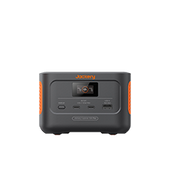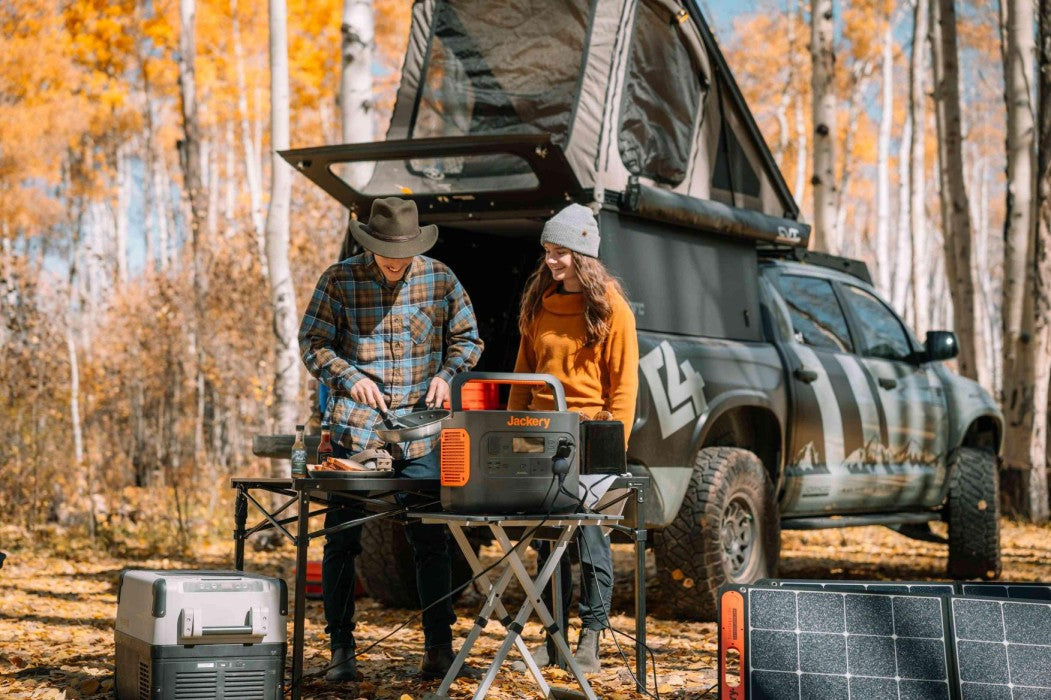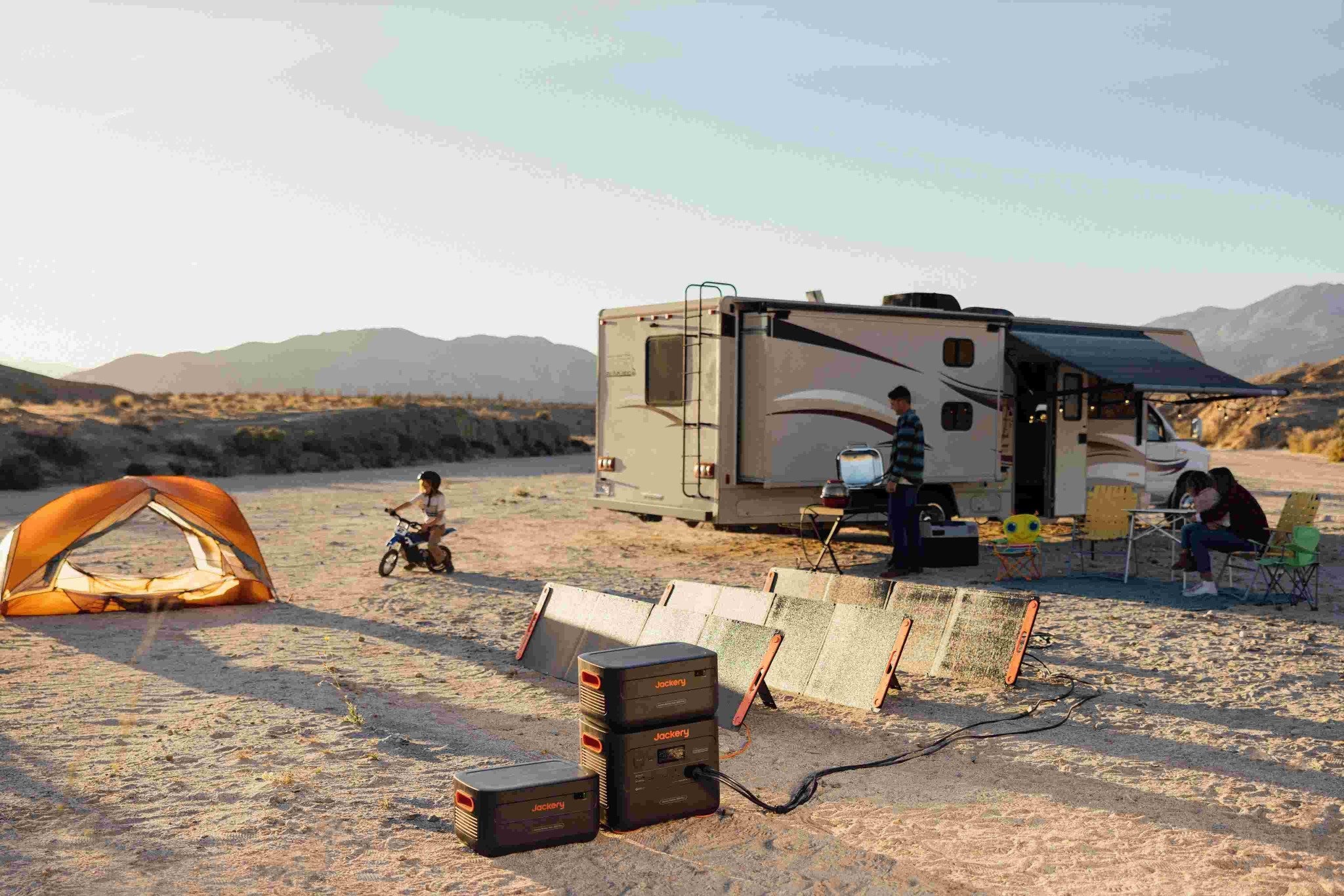Camping is a great way to get out and enjoy Great Britain's beautiful outdoors. However, some outdoor adventures, such as hiking and kayaking, may require you to travel light and may need help to bring a fridge.
So, what food should you take when camping without a refrigerator? And how do you store food without a refrigerator? Proper food choices are essential to staying nutritious during your adventure. Also helpful are practical tips on how to keep food fresh without refrigeration.
Besides, we highly recommend Jackery Solar Generator, a portable solar power solution to charge your portable coolers, mini-fridges or refrigerators on your camping trip. If you worry about bad weather, wall outlets or a carport can recharge the Portable Power Station.
|
Key Takeaways: |
|
- Bringing food when camping without a fridge requires proper planning. - Here are some creative ideas for making outdoor meals with camping ingredients that don't require a fridge. - There are some rules to follow when preserving food without a fridge. - Portable fridges have always been famous for keeping food and drinks cold while camping. - We highly recommend Jackery Solar Generator 1000 Plus and 1000 v2 to keep your food fresh by charging refrigerators for your camping. |
What Food to Take Camping Without Fridge?
One of the main challenges of camping is managing food storage and ensuring that it stays fresh and safe. Therefore, camping without a refrigerator is particularly tricky. What food should you bring when camping without a fridge? Proper planning and the right food selection are essential to staying nutritious and enjoyable during your adventure.

Dry Food
Dry food will always top any list of must-have camping food because it is lightweight, easy to store, and non-perishable. In addition, dry food is versatile and can often serve as your essential ingredients. When choosing dry food for your camping trip, be sure to consider the following types of dry food:
Cereals are among the most basic foods when camping. They are non-perishable, nutritious, and lightweight. Most cereals are easy to cook and can make hearty and filling meals. Instant oatmeal and brown rice are excellent whole-grain sources that provide long-lasting energy.
Pancakes can be quickly cooked in a frying pan, and you can add flavour by adding dried fruits, sauces, honey, and other ingredients.
Bread is not refrigerated and can be easily stored in a backpack. They can be used to make sandwiches. Whole grain foods are best for fibre and nutrition.
Instant noodles are easy to prepare, delicious, and filling. They are also lightweight and take up little space in your backpack. Instant noodles come in various flavours and can be supplemented with other ingredients, such as canned vegetables or meat.
Canned Food
Canned foods are excellent for camping meals because they are non-perishable, easy to store, and don't require a refrigerator. They are also available in various affordable options to suit multiple meal needs.
Canned foods can usually be eaten straight from the can or heated up before eating. However, remember to eat canned foods as soon as possible after opening to avoid spoilage. Here are some of the canned foods to choose from:
Canned meats: Protein-rich canned meats are great for sandwiches, salads, or mixed with rice.
Canned fish is excellent for quick meals, such as tuna sandwiches or fish salad. It usually comes with various seasonings, so no additional seasoning is needed.
Canned vegetables: Vegetables like corn, beans, or peas can add nutrition and variety to your meals. Canned vegetables are usually added to soups or stews. Canned beans, typically black beans, chickpeas, and kidney beans, contain protein and fibre. They can be added to salads or eaten straight from the can.
Canned fruit is an excellent alternative to perishable fresh fruit. It is often a healthy breakfast accompaniment, dessert, or simple camping snack. Canned fruit includes pineapples, pears, peaches, prunes, mangoes, and more.
Fresh Ingredients
Even without a refrigerator, many fresh ingredients can be stored at room temperature without spoiling.
Fresh fruit provides essential vitamins and minerals. Apples and oranges have a long shelf life and do not spoil quickly, even if not refrigerated. Vegetables provide vitamins and dietary fibre and can be eaten raw or added to meals. Carrots, potatoes, beets, and other cold-tolerant vegetables can be stored without refrigeration.
Seasonings
Simple seasonings and spices can add variety to your camping meals. Every camper will want to ensure they have basic seasonings like salt, cumin, pepper, and chilli powder on their trip, as they are required for many essential recipes. In addition, we recommend the following seasonings:
Sugar is a camping essential. It adds sweetness to tea, coffee, and hot chocolate and reduces ketchup's acidity.
Sauces: To add extra flavour to your meals, pack small bags or bottles of sauces such as ketchup, mayonnaise, mustard, and peanut butter in advance. Jam is also great for stirring into oats or spreading on sandwiches.
Snacks
In addition to the essential camping foods mentioned above, here are a few additional camping snacks that can replenish energy:
Jerky (beef jerky, chicken jerky, pork jerky, vegetarian jerky, etc.) is rich in protein, can quickly replenish energy and satisfy hunger, and is an excellent alternative to bacon and sausage. They do not need to be refrigerated and are easy to carry. Alternatively, you can buy some pre-cooked bacon that does not need to be refrigerated and can be heated and eaten like fresh bacon.
Energy bars can help you stay energised. Cereal bars or protein bars are usually convenient, non-perishable, and nutritious.
Biscuits are excellent camping foods because they are small and do not require cooking.
Chocolate is a sweet snack that is easy to carry and quickly replenishes energy.
Dried fruits and nuts provide a good combination of carbohydrates, healthy fats, and protein. They are lightweight, do not require much space, and have a long shelf life. In addition, dried fruits are a great way to satisfy your sweet tooth while providing rich vitamins and minerals. Dried fruits generally include raisins, apricots, dates, and nuts.
Camping Food Ideas That Don't Refrigerate
Preparing meals for camping can be complicated, especially if it's your first time. Below, we'll provide some creative ideas for making outdoor meals with camping ingredients that don't require a refrigerator.

Camping Breakfast Ideas
Breakfast This is the most important meal of the day. When camping, your breakfast should be full of energy and protein to help you get to lunch. Here are some practical ideas for camping breakfasts that don't require a refrigerator:
Oatmeal with Nuts: Nothing is more straightforward and nutritious than instant oatmeal with fruit and nuts for a camping breakfast.
Pancakes: Instant pancake mix makes it easy to make camp pancakes (baked on the stove or fireplace grill) and serve them with peanut butter or jam. In addition, cereal bars, granola bars, bread (with jam or peanut butter), and instant canned foods are all good breakfast options. Of course, you can also have coffee or hot chocolate in the morning.
Camping Lunch Ideas
Outdoor activities are always the most physically demanding, and it may take little time for you to feel hungry after breakfast, so prepare your lunch in advance. Here are some camping lunch ideas:
Sandwiches are classic camping foods that are simple to make and delicious. The most straightforward sandwiches only require peanut butter or jam. Of course, you can add canned meats or canned vegetables to make a more substantial sandwich, such as a tuna sandwich.
Salads: Refreshing salads based on grains (such as quinoa) are perfect for camping and can be paired with canned vegetables, beans or meats. Vegetable couches are also delicious with potatoes and jerky (or bacon).
Soup or Stew: A delicious and simple soup or stew can be quickly prepared on a camp stove. A hot soup or stew is the perfect choice, especially when camping in cold weather.
Camping Dinner Ideas
After a day of camping activities (hiking, boating), you will want to eat a satisfying dinner to replenish your body's energy. Here are some suggestions for camping dinner:
Baked Potatoes: You can bake potatoes over the campfire with tin foil or bury them in the hot coals until they are crispy on the outside and soft on the inside. Then, sprinkle cheese or chilli powder on the baked potatoes, and you can enjoy a delicious and filling dinner.
Staff with Vegetables or Canned Meat: Pair instant noodles or bread with vegetables or canned meat for a convenient and nutritious dinner.
Burgers: You can make a simple burger with pre-prepared burger buns and sealed sausages or bacon. Of course, you can also add any seasonings or additives you like.
Rules for Taking Food While Camping without Fridge
Whether a regular camper or a newbie, bringing the right food ensures you stay energised, well-nourished, and satisfied. Even if you can't keep your food cold, you must bring whole, nutritious foods. Follow these rules for bringing food when camping without a refrigerator:
Choose Non-perishable Foods
When buying camping food without a refrigerator, choose items that don't need to be refrigerated at the grocery store. Also, choose foods that have a long shelf life.
Choose Small Packages
Remember that some camping foods will spoil if not eaten after opening the package. So try to buy small packages that can be eaten as soon as possible after opening.
Plan Your Meals Well
Plan your meals to ensure sufficient ingredients to avoid waste and shortages. This should include complete non-refrigerated camping meals, such as breakfast, lunch, dinner, and snacks. Also, remember that simple recipes are more accessible to prepare when camping.
Store Properly
Store food in airtight containers or dry bags.
Be Food-Safe
Good hygiene and food safety are essential even when outdoors. For example, carefully wash your hands and ingredients before handling and cooking food.
How to Keep Food Without A Fridge While Camping?
Suppose you need a refrigerator when camping; storing your food correctly is crucial. Keeping food fresh and safe while camping without a fridge requires careful planning and various strategies. Here are some practical ways:

Tip 1: Keep Food in the Shade
Most foods can't survive in direct sunlight, so keep them out of direct sunlight to prevent them from spoiling. But remember to check to ensure they're in the shade as the sun's position changes.
Tip 2: Use Dry Bags and Airtight Containers
Dry foods can be stored longer in airtight bags or containers.
Airtight containers keep out air and moisture, extending the shelf life of foods like pasta, rice, nuts, and dried fruit. Airtight containers also help keep food away from insects and moisture.
Waterproof dry bags protect food from moisture and water, making them ideal for storing dry foods like bread, cereal, and snacks.
Freezer bags can also prevent foods like fresh fruits and vegetables from spoiling too quickly. Vacuum sealing can preserve food by extracting air from the packaging, making it compact and waterproof. Be careful to separate foods when sealing, especially meats, to avoid cross-contamination and make them easier to find.
Tip 3: Natural Cooling
If your campsite is near a cold stream or river, keep your food cool by storing it in waterproof containers. Alternatively, you can store food in containers buried in more excellent soil.
Tip 4: Homemade Coolers
You can even make your own simple coolers to keep your food fresh. Ice is the most essential tool for keeping food cold. To maintain a constant temperature, pre-cool your prepared cooling container with ice packs before adding ice or ice packs.
How to Keep Food with A Portable Fridge While Camping?
Portable refrigerators have always been famous for keeping food and drinks cold while camping. They are compact, lightweight, and efficient, perfect for camping and outdoor adventures. So, how do you use a portable refrigerator to preserve food while camping?
Unlike coolers, which struggle to maintain a constant temperature, portable refrigerators offer precise temperature control. Additionally, unlike traditional camping coolers that rely on ice, portable refrigerators use electricity, allowing you to keep food fresh without constantly refilling the ice.
To make the most of your portable cooler while camping, consider these helpful tips:
- Consider using an insulated cover or blanket to further insulate the cooler.
- Try to keep the more relaxed level to prevent leaks.
Charging a Portable Refrigerator
Using a portable refrigerator while camping allows you to enjoy fresh food and drinks wherever your outdoor adventures take you. What are the available power options for portable refrigerators?
Vehicle Battery: Utilising your vehicle's battery is one of the easiest and most common ways to run a portable refrigerator while camping. Most portable refrigerators can be directly connected to the vehicle's cigarette lighter or accessory outlet. However, it is essential to remember to run the engine regularly to recharge the battery.
Portable Power Station: Another popular power source option for powering a portable refrigerator while camping is a portable power station. Although portable power stations are small, they can provide a steady power supply for long periods. Jackery Portable Power Stations are best for camping cooking since their capacity varies from 99Wh to 12 kWh. They can cover everything, whether a small portable cooler or a big refrigerator.
Solar Power: Solar power is an environmentally friendly and convenient option for running a portable refrigerator while camping. A solar panel or solar generator can keep a portable refrigerator running steadily. Jackery Solar Generator combines Jackery Solar Panels with a Portable Power Station to turn sunlight into electricity to charge refrigerators easily.
How to Charge Fridges in Camping with Jackery
As mentioned above, the solar generator is the optimal choice for charging refrigerators in camping since it uses solar energy (unlimited green energy) to charge appliances outdoors effectively. There are many brands of solar generators, and Jackery is one of the best.

Jackery Solar Generators are comprised of SolarSaga Solar Panels for solar energy capture and Explorer Portable Power Stations for energy storage for further utilisation. The generator can supply power to numerous items, including but not limited to refrigerators.
Moreover, this user-friendly solar generator requires minimal maintenance, rendering it a dependable option for emergencies or blackouts. Here, we recommend Jackery Solar Generator 1000 Plus and 1000 v2.
|
Appliances |
Solar Generator 1000 Plus (1.25-5 kWh) |
Solar Generator 1000 v2 (1070Wh) |
|
Mini Fridge (350W) |
3-12.1H |
2.6H |
|
Portable Cooler (300W) |
3.6-14.3H |
3H |
|
Refrigerator (700W) |
1.53-6.1H |
1.3H |
|
Ice Maker (500W) |
2.1-8.5H |
1.8H |
Jackery Solar Generator 1000 Plus
Jackery Solar Generator 1000 Plus combines SolarSaga 100W solar panels with Explorer 1000 Plus. We will introduce the two components respectively. Due to its expandable capacity, it can power refrigerators for a few days.

- Excellent Power Output: The Explorer 1000 Plus power station boasts an excellent 1264Wh long-lasting LiFePO4 battery and a 2000W full-power pure sine wave inverter, supplying almost all required power. Adding up to three additional battery packs will remarkably increase its capacity to 5kWh, sufficient for charging fridges for a few days.
- Expandable Powerhouse: Adding up to three extra battery packs lets Jackery's exclusive technology boost the Explorer 1000 Plus capacity from 26kWh to5kWh. Moreover, it has a maximum output of 2000W, 20% more than usual 1kWh LFP generators.
- Higher Solar Conversion Rate: The Jackery SolarSaga 100W Solar Panel boasts a solar conversion rate of up to 25%; it is optimally designed for outdoor use and unforeseen power interruptions. The solar panel weighs about 8 lbs, is lightweight, foldable, and equipped with a convenient carry handle, enhancing its portability.
|
*Review from Our User |
|
First, this item is robust and space-efficient, fitting seamlessly in my workspace (see pic). When the power goes out, it becomes a real game changer. I can continue my tasks as if everything is normal, which is quite impressive. The most advantageous aspect for me? The USB-C ports. I can connect my Mac directly to it without needing an adapter. Incredibly useful! |
Jackery Solar Generator 1000 v2
Jackery Solar Generator 1000 v2 is the smallest and lightest 1 kWh solar generator for fridges in camping, which pairs the Explorer 1000 v2 portable power station with SolarSaga 100W solar panels. Compared to Solar Generator 1000 Plus, it is more suitable for charging portable coolers or mini-fridges.

- Charging Several Appliances Simultaneously: The Explorer 1000 v2 portable power station provides a phenomenal 1500W output, 50% more than prior editions, to efficiently run high-demand needs, including refrigerators, ovens, portable air conditioners, etc. With USB-A/C connections and up to 100W dual PD charging, it can charge several devices (phone, laptop) concurrently, therefore serving as the best friend for all your power requirements.
- Multiple Recharging Options: The Emergency Charge Mode lets the Explorer 1000 v2 Portable Power Station be wholly charged in less than an hour, providing vital power backup when your battery runs low. If you want to recharge it, it will take 5 hourswith wall outlets or 12 hours for car charging. Besides, a SolarSaga 100W solar panel will take 15 hours to recharge fully.
- Best for Camping: Enhance your camping experience with the Jackery 1000 v2. Effortlessly energise your camping necessities, including lighting, coolers, and portable stoves, while ensuring your devices remain charged to document every memorable experience, allowing you to relish the outdoors without compromising contemporary convenience.
|
*Review from Our User |
|
The Jackery Explorer 1000 v2 bundle with a 100W solar panel is nicely priced in the UK and can be found directly from Jackery. I think Jackery totally nailed it with the new upgraded V2 version of their Explorer model! It's like the perfect combo of power and weight! So impressed! |
FAQs
The following are the frequently asked questions about the food to take camping without a fridge in the UK:
- What foods can last longer without refrigeration?
Whether you're looking for something quick and easy to make at the base or planning on packing some camping snacks for the trail, how long it lasts is critical. Foods that last longer without refrigeration are generally low in moisture, have good preservative properties, and are stored properly. Typically, these foods include nuts, jerky, canned goods, and whole-grain cereals.
- What drinks can you bring when camping without a fridge?
It's essential to stay hydrated while camping, so drink water regularly. Of course, consider bringing some extra drinks in addition to water.
|
Drinks Take to Camp |
Details |
|
Tea and coffee |
Tea bags or instant coffee are perfect for camping. |
|
Ambient milk |
Another alternative to fresh milk is ready-to-go milk that doesn't need to be constantly refrigerated like fresh milk. |
|
Hot chocolate |
Hot chocolate is the ultimate comforting warming drink, and it's easy to make with hot water or milk. |
|
Reducible juice |
Reducible juice is an easy-to-store, lightweight alternative to water that will not take up too much space in your backpack. |
|
Sports drinks |
Sports drinks can give you a boost of energy when you need it most. |
- What should I pack without a refrigerator for a three-day camping trip?
Variety is vital for a three-day camping trip. For convenience and sustainability, try to choose lightweight, nutritious foods that don't require refrigeration. Pack some fresh ingredients, whole grain cereals, canned foods, nuts, and energy bars if possible.
Final Thoughts
Camping in the wild means being away from any power source, which can limit your ability to charge your devices. However, not having a fridge while camping doesn't mean you must compromise on delicious and nutritious meals. Choosing non-perishable foods and planning your meals properly can keep you energised and nourished throughout your camping trip. Additionally, innovative energy solutions like the Jackery Solar Generator offer a reliable and sustainable way to power a portable fridge to keep food fresh.






























































































